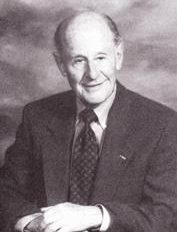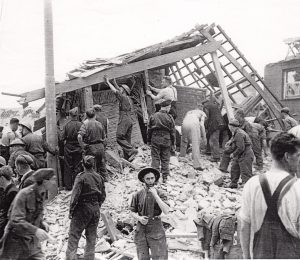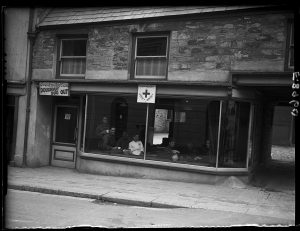Captain John Alan Kerner
110th medical battalion, 35th Infantry Division

John Alan Kerner served as a combat medic with the 35th Infantry during the Second World War. The information here comes from his book Combat Medic– which was itself partially constructed from letters he’d received and sent during the war – and from the transcription of an interview conducted in 2015. He received the Legion d’Honneur and is in the 35th Division’s Hall of Fame. Kerner spent part of the lead up to D-Day in Bodmin, where he stayed in a schoolhouse.
Born in 1919, Kerner was called up to join the US Army part way through medical school. He attended in San Francisco, and trained in obstetrics and gynaecology. His notice came on Christmas Eve, and he was told to report for duty on the 26th. Fortunately, he had a friend who was already in the army who helped him get the uniform before he reported for duty. He told his family over dinner while wearing his new uniform and says that they couldn’t believe it and nor could he. He’d been in the ROTC during college and had later been in the reserves, but it was still a surprise for him to have been drafted. However, thinking he’d be in a field hospital behind the front lines, his family weren’t especially worried for him.
After his basic training, Kerner was sent to finish his internship in a military hospital. Here he treated patients with tuberculosis, before being transferred to the obstetrics department. It was heavenly for him: for the first time he had a proper surgery schedule and nurses to help him. However, he was soon moved to the less comfortable Camp Hale with the 10th Mountain Division. It was here that Kerner learned how to treat frostbite, a skill which later became invaluable during the Siege of Bastogne. He only spent a short time with the 10th Mountain Division before being transferred to the 35th Infantry Division, who would later go on to be stationed in Bodmin. Kerner was assigned to a collecting company, a role he’d continue to have during the Allied invasion of Europe.
Most of the things the medics in a collecting company were supposed to do were holdovers from the First World War; they were expected to immediately go to the wounded and do what they could for them in the field. The wounded would then be carried on litters to a nearby aid station. Later on in combat, Kerner said these techniques were absurd, and soon learned to evacuate the wounded on stretchers attached to Jeeps. He noted that the men who invented the clips with which to attach the stretchers were ordinary farm boys, not high-ranking officers. Kerner’s dedication to treating patients to the best of his ability rather than simply following guidelines is commendable. There are many places in his memoirs and interview where he mentions improving upon what he’d been instructed, and he even argued with a colonel under threat of court martial when told to send soldiers with severe frostbite back into battle.
The ship over to Europe, the H. B. Alexander, was cramped. Kerner shared a stateroom with five other officers. They slept there in twelve hour shifts, and spent their time away from the stateroom dealing with any medical problems on the ship. The convoy in which the ship travelled was attacked by German U-boats, but as Kerner’s ship was close to the centre of the convoy, he felt apprehensive though not especially worried. When he finally arrived in Liverpool, they were all greeted by English girls bearing doughnuts and apples. Though the food was nice, he said he appreciated the girls more. In return, the American GIs tossed oranges and American cigarettes to the British soldiers, knowing they’d not been able to have any in a long while.
After his first ride on a European-style train, evocative of stories Kerner had read, he arrived in Bodmin. To him, a California native, the lush green fields and rhododendrons around the station were novel and beautiful. In his memoirs, Kerner talks a lot about how he admired the flora of the Bodmin area, even if he did suffer from bad hay fever which often prevented him from doing long road marches. He enjoyed the physical exercise and the chance to explore the countryside on these marches, but often had to miss them as there was no medicine to treat hay fever back then.
Cornwall wasn’t Edenic and untouched by the war, however, Kerner mentions that even the smaller towns he passed through on marches were scarred by bombs, and that one of the churches in Bodmin had been mostly destroyed.

The shops, while well-kept, had very little stock, and there were few cars on the roads compared to the US. It was much the same over the Tamar. During a visit to Plymouth, Kerner writes that the ruined buildings were simply cleaned as there weren’t enough supplies or people around to rebuild them. His encounters with women also showed the hardships everyone faced in wartime Britain. The women he dated and danced with appeared to be a little distant; Kerner postulates that it was so they’d be prepared in the event of his death. So many British men had been killed that some women struggled to get close to the visiting Americans in case they too died.
The officers were temporarily billeted in a schoolhouse before being moved into a small hotel. The men who’d been there before them had moved closer to the embarkation point, and though the repurposed hotel doesn’t sound especially comfortable, it was certainly better than tents. He shared the room with one other medical officer, and they were assigned a batman – a private who would look after their uniforms and keep their room clean for a little extra pay. He found that he disliked most of the food, calling it ‘classic British’ with lots of bread and kippers. Though cream, made from the milk of the cows in the tidy fields he found so pretty, was a favourite, especially with strawberries.
It was after moving into town that Kerner met a local woman, Ann, and was asked to dinner. He’d met her as she worked at a Red Cross canteen, and was happy to make conversation with someone so well-educated. Kerner’s experiences with women up to that point had been brief, and he’d not been able to have long conversations with them.

Ann’s family owned a large hotel outside of Bodmin, and the man to whom she’d only been married a short while had been serving in India for the past two years. They would talk as he visited the canteen for coffee, and they danced at a ball for officers where she’d been serving drinks. In his memoirs, Kerner recounts the furniture and design of the hotel belonging to Ann’s family in minute detail. His mother had been an interior decorator, and it must have been wonderful for him to see beautiful furnishings after months of practical military housing. He said it reminded him of home. Though their acquaintance was so brief, the level of detail Kerner goes into implies that the friendship he had with Ann was very important to him. It was soon that Kerner had to move closer to the embarkation site. He said goodbye to Ann in a hurry, and was reviewed by Eisenhower, Patton, and Churchill along with the rest of his battalion before leaving for Normandy.
Although he wasn’t one of the first waves to hit the beaches, Kerner still saw a great deal of destruction and always tried to lead his men by example. When an American soldier was wounded and stuck in the middle of a minefield, Kerner crawled out before his men. He treated wounded civilians, and even delivered a complicated breech birth during the battle of Mortain. Along with his driver, Gangster (who had been a smuggler during the Prohibition), he volunteered to cross German lines to treat wounded American soldiers trapped in a quarry, a scene he described as being like something from the American Civil War. When fired on by an SS division in France, his superior officer offered him a rifle, as the Germans had broken the Geneva Convention. He refused to carry it, saying that he wanted to dedicate himself to helping others and not to killing. Kerner sometimes used Benzedrine, a tablet form of amphetamine, to stay awake and aid as many people as he could. It was this level of dedication to his job and saving lives that was taken into account when he was awarded his Bronze Star medal.
After the war, Kerner returned to San Francisco to continue his work as a physician. He met his wife, who helped him out of a depressive episode he’d experienced post-war. Kerner changed his name from Kapstein due to the antisemitic prejudice he’d suffered in the military. He says he didn’t want his children to be treated as he had been.
